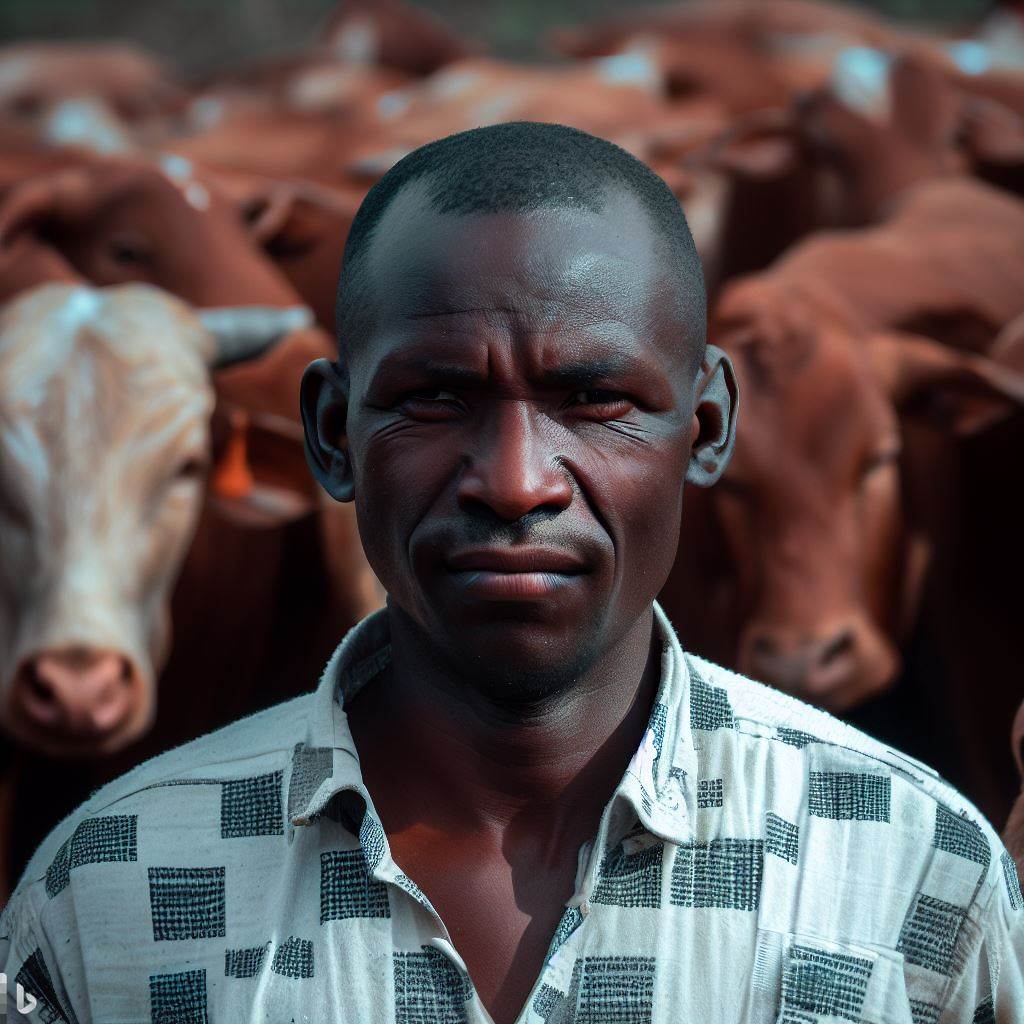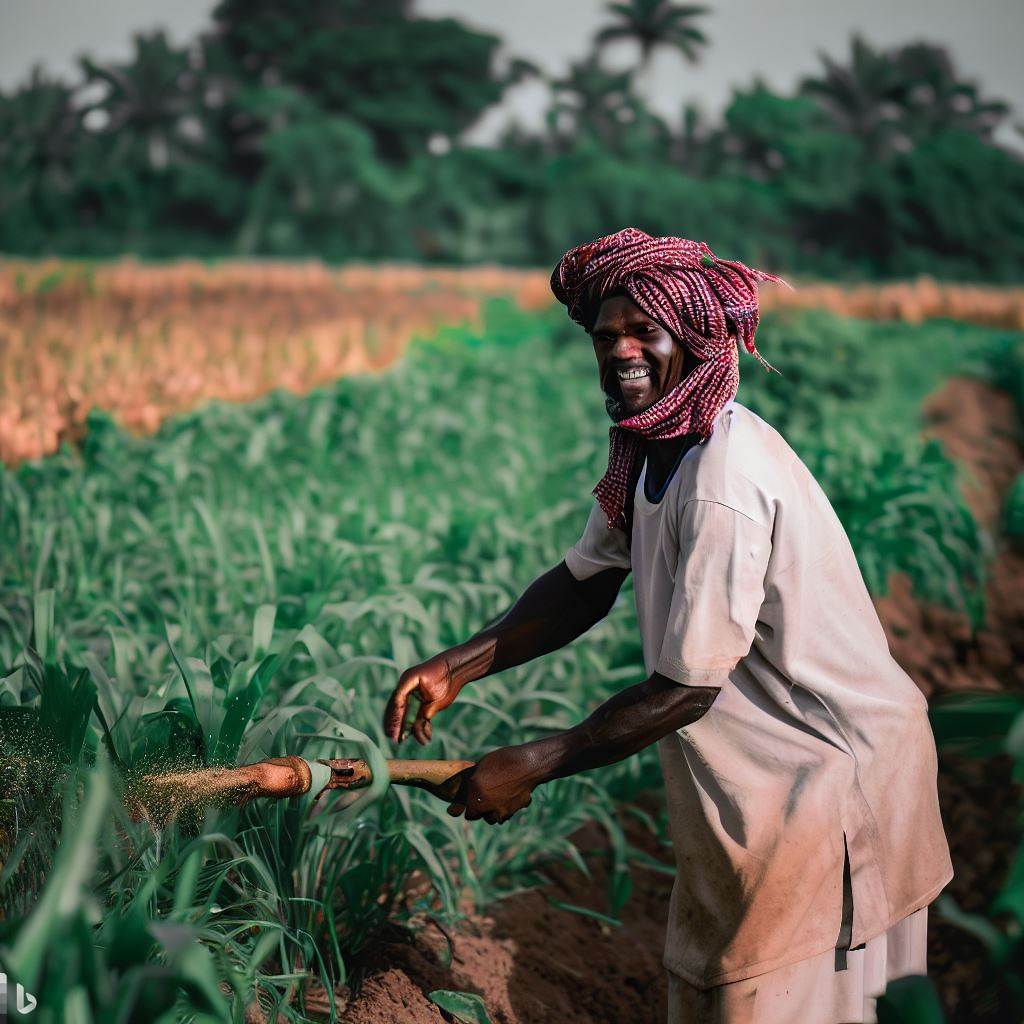Introduction
Livestock production is of paramount importance in Nigeria due to its significant contributions to the economy and food security.
However, livestock producers in the country face various challenges that hinder their productivity and profitability.
One major challenge is inadequate access to quality animal feed and veterinary services.
This limits the ability of producers to provide proper nutrition and healthcare to their livestock.
Additionally, poor infrastructure such as roads and electricity supply hinder transportation and storage of livestock products.
This results in losses and reduced market access for producers.
Furthermore, livestock diseases such as avian influenza and foot-and-mouth disease pose a constant threat to the industry.
Lack of effective disease control measures and improper vaccination programs exacerbate the impact of these diseases.
Moreover, insecurity and conflicts in some regions of Nigeria disrupt livestock production, leading to loss of animals and livelihoods.
Market volatility and limited market opportunities also pose challenges for livestock producers.
Fluctuating prices and limited access to markets impede profitability and sustainability.
Basically, while livestock production is important in Nigeria, producers face various challenges including inadequate access to feed, veterinary services, poor infrastructure, disease outbreaks, insecurity, and limited market opportunities.
Addressing these challenges through effective policies and interventions is crucial to ensure the growth and sustainability of the livestock industry in Nigeria.
High cost of production
Livestock producers in Nigeria face several challenges that hinder their productivity and profitability.
Rising costs of animal feed make it difficult for producers to afford an adequate supply
The rising costs of animal feed significantly impact livestock producers in Nigeria. As feed prices continue to increase, it becomes challenging for producers to afford an adequate supply for their animals.
This not only affects their profitability but also the overall health and growth of the livestock.
Lack of access to affordable veterinary services increases expenses for livestock healthcare
Furthermore, the lack of access to affordable veterinary services adds to the challenges faced by livestock producers.
The cost of veterinary services is often high, making it difficult for producers to provide proper healthcare for their animals.
This can lead to untreated illnesses and diseases, resulting in decreased productivity and potential losses for the producers.
Infrastructural challenges, such as unreliable electricity and water supply, hinder efficient production
Infrastructural challenges, such as unreliable electricity and water supply, also contribute to the difficulties faced by livestock producers.
Lack of electricity disrupts operations such as milking, cooling, and processing. Additionally, inadequate water supply affects the health and hygiene of the animals.
These challenges not only increase production costs but also affect the quality of the livestock products.
The increased expense of disease control and prevention puts additional financial strain on producers.
Moreover, the increased expenses of disease control and prevention further burden livestock producers.
Outbreaks of various diseases can lead to significant economic losses, as infected animals may need to be culled or treated extensively.
The cost of vaccines and medications needed to prevent and control diseases adds to the overall production expenses.
Essentially, the challenges faced by livestock producers in Nigeria, including the high cost of production, rising costs of animal feed, lack of access to affordable veterinary services, infrastructural challenges, and increased expense of disease control and prevention, significantly impact their productivity and profitability.
Addressing these challenges is crucial to support and enhance the livestock industry in Nigeria.
Read: Beekeeping in Nigeria: An Emerging Agricultural Job
Inadequate funding and financial constraints
Limited access to credit and loans
When it comes to livestock production in Nigeria, there are several challenges that producers face. One of the major hurdles is inadequate funding and financial constraints.
This includes limited access to credit and loans, which makes it difficult for farmers to invest in their operations.
Insufficient government support and subsidies
Another challenge is the insufficient government support and subsidies for livestock producers.
Without proper assistance, farmers struggle to afford necessary resources and upgrades, hindering their ability to improve production efficiency.
Inability to invest in modern farming practices
Additionally, the inability to invest in modern farming practices is a significant challenge for livestock producers.
Without access to advanced technology and equipment, farmers find it challenging to keep up with industry advancements and increase their productivity.
Difficulty in expanding production or upgrading facilities
Expanding production or upgrading facilities is also a challenge faced by livestock producers in Nigeria.
Without sufficient funding or government support, farmers can’t expand their operations or improve their facilities, which hampers growth and limits their potential profitability.
Overall, the combination of inadequate funding, limited access to credit, insufficient government support, and an inability to invest in modern farming practices poses significant challenges for livestock producers in Nigeria.
These obstacles hinder their ability to improve production efficiency, expand their operations, and ultimately achieve long-term success.
In order to address these challenges, there are several potential solutions. First and foremost, increased funding and financial assistance should be made available to livestock producers.
This can be done through government programs, partnerships with financial institutions, and the establishment of farmer cooperatives.
Additionally, the government should provide more support and subsidies specifically targeted towards the livestock industry. This can help farmers afford essential resources, invest in modern farming practices, and upgrade their facilities.
Furthermore, livestock producers should explore alternative sources of funding such as crowdfunding or private investments. This can help supplement limited access to credit and reduce the financial constraints faced by farmers.
Lastly, collaborations and knowledge sharing amongst livestock producers can be beneficial. By forming networks and sharing best practices, farmers can learn from each other and collectively work towards overcoming the challenges they face.
In essence, livestock producers in Nigeria face numerous challenges that hinder their success.
Inadequate funding, limited access to credit, insufficient government support, and an inability to invest in modern farming practices all contribute to these challenges.
However, by increasing funding and financial assistance, providing targeted government support, exploring alternative funding sources, and promoting knowledge sharing, these challenges can be addressed.
With the right resources and support, livestock producers in Nigeria can overcome these obstacles and thrive in the industry.
Read: Building a Career in Farm Management: Nigerian Perspectives
Insecurity and theft
One of the major challenges faced by livestock producers in Nigeria is insecurity and theft.
Threats from armed bandits and herdsmen
Livestock producers constantly face threats from armed bandits and herdsmen who pose a significant risk to their livelihoods. Armed bandits and herdsmen often target livestock producers, their animals, and their properties.
They engage in acts of violence, including kidnapping, killing, and stealing livestock. This not only leads to financial losses but also creates a sense of fear and insecurity among livestock producers.
Rustling and illegal cattle trade
Rustling and illegal cattle trade are also prevalent challenges. Criminal syndicates engage in stealing cattle and selling them in the black market.
This illegal trade not only deprives livestock producers of their animals but also contributes to the rise in prices for consumers.
Destruction of farmland by nomadic herdsmen
Additionally, nomadic herdsmen often destroy farmland while moving their cattle from one grazing area to another.
They trample on crops, causing significant damage to the agricultural productivity of livestock producers. This leads to further economic losses and hampers food production.
Lack of adequate security measures and law enforcement
Livestock producers also face challenges due to the lack of adequate security measures and law enforcement.
There is a need for effective security measures, such as the establishment of ranches and cattle colonies, to ensure the safety of livestock and prevent theft and violence.
Law enforcement agencies need to actively address the issue of insecurity and theft faced by livestock producers. They must take proactive measures to apprehend and prosecute those involved in theft, rustling, and illegal cattle trade.
Nigeria’s government should invest in the training and equipping of livestock producers to enhance their security capabilities. This could involve providing them with tools and resources to protect their animals and properties.
Furthermore, collaboration between livestock producers, local communities, and law enforcement agencies is crucial.
Livestock producers can work together to establish community-based security networks, which can help deter theft and provide a sense of collective security.
Livestock producers may also explore the use of technology to enhance their security. Installing CCTV cameras, implementing GPS tracking devices on animals, and using mobile apps for surveillance can help monitor and protect livestock more effectively.
In a nutshell, insecurity and theft pose significant challenges for livestock producers in Nigeria.
Addressing these challenges requires a multi-faceted approach, including implementing adequate security measures, strengthening law enforcement, and promoting collaboration among stakeholders.
By doing so, the government can better support the livelihoods of livestock producers and promote sustainable agricultural practices in the country.
Read: Challenges and Opportunities in Nigerian Farm Management

Climate change and environmental factors
Climate change and environmental factors have presented numerous challenges for livestock producers in Nigeria.
Droughts, floods, and other extreme weather events
Droughts, floods, and other extreme weather events have become increasingly frequent, causing significant disruptions to livestock production.
Decreased water availability and grazing land
These natural disasters result in the loss of grazing land and decreased water availability, making it difficult for livestock to find adequate nourishment.
Increased vulnerability to diseases and pests
As a result, livestock producers are often forced to search for alternative sources of food and water, leading to additional expenses and logistical challenges.
Furthermore, climate change has also increased the vulnerability of livestock to diseases and pests.
Changes in weather patterns and increased temperatures provide ideal conditions for the proliferation of parasites and pathogens that can harm livestock.
These diseases not only cause direct harm to the animals but also result in reduced productivity and financial losses for livestock producers.
Lack of awareness about climate-smart farming techniques
Unfortunately, many livestock producers in Nigeria lack awareness about climate-smart farming techniques that could help mitigate the effects of climate change.
These techniques include implementing sustainable grazing systems, improving water management strategies, and adopting innovative animal husbandry practices.
By implementing these climate-smart farming techniques, livestock producers can better adapt to changing environmental conditions and reduce their vulnerability to climate-related challenges.
However, the lack of awareness and access to information about these techniques remains a significant barrier for many livestock producers.
Education and training programs are crucial in providing livestock producers with the knowledge and skills necessary to implement climate-smart farming practices.
These programs can help them understand the importance of sustainable land and water management and provide practical guidance on implementing these practices.
Furthermore, government and non-governmental organizations should also play a role in supporting livestock producers in their efforts to tackle climate change challenges.
Financial assistance, access to resources, and the establishment of research and extension services can facilitate the adoption of climate-smart farming techniques.
In the end, climate change and environmental factors pose significant challenges for livestock producers in Nigeria.
Droughts, floods, decreased water availability, increased vulnerability to diseases and pests, and the lack of awareness about climate-smart farming techniques all contribute to the difficulties faced by livestock producers.
However, with the right support, education, and resources, livestock producers can overcome these challenges and build a more resilient and sustainable industry.
Lack of skilled manpower
Shortage of trained veterinary professionals
Lack of skilled manpower is one of the major challenges faced by livestock producers in Nigeria. This shortage of trained veterinary professionals hampers the effective management of livestock and the prevention and treatment of diseases.
The country is in need of more skilled individuals who can provide quality healthcare and expertise in livestock production.
Inadequate knowledge of modern livestock management practices
Additionally, there is an inadequate knowledge of modern livestock management practices among many livestock producers in Nigeria.
Publish Your Professional Profile, Business or Brand
Showcase your expertise, gain trust, and boost visibility instantly on Professions.ng.
Publish NowMany are not aware of the latest techniques and best practices in breeding, feeding, and disease control. This lack of knowledge hampers the productivity and profitability of livestock farming in the country.
Limited access to educational resources and training programs
Moreover, limited access to educational resources and training programs is a significant challenge faced by livestock producers.
Many farmers do not have access to reliable sources of information and training materials that can help them improve their skills and knowledge in livestock production.
This lack of access hinders their ability to adopt modern and efficient practices.
Brain drain to urban areas and foreign countries
Furthermore, brain drain to urban areas and foreign countries exacerbates the shortage of skilled manpower in the livestock industry.
Many skilled professionals in the field of veterinary medicine choose to migrate to urban areas or even leave the country entirely to seek better opportunities.
This brain drain further restricts the availability of trained personnel in rural areas where livestock farming is prevalent.
How to address these challenges
To address these challenges, there is a need for increased investment in veterinary education and training programs.
The government should allocate more resources to improve the training and education of veterinary professionals, including the establishment of specialized livestock management programs in universities and training centers.
Efforts should also be made to provide better access to educational resources for livestock producers.
This can be done through the development of online platforms and mobile applications that provide information and training materials on livestock management practices.
These platforms should be accessible and user-friendly, catering to the diverse needs of livestock producers in different regions of the country.
In addition to this, policies should be put in place to incentivize and retain skilled professionals in the livestock industry.
This can be done through providing attractive salary packages, career advancement opportunities, and creating a conducive work environment in rural areas.
Promoting entrepreneurship and offering financial support to aspiring livestock producers can also encourage more individuals to enter the industry and contribute to its growth.
All in all, the lack of skilled manpower is a significant challenge faced by livestock producers in Nigeria.
Shortage of trained veterinary professionals, inadequate knowledge of modern livestock management practices, limited access to educational resources, and brain drain to urban areas and foreign countries all contribute to this challenge.
Addressing these issues requires increased investment in education and training programs, improved access to educational resources, and policies that incentivize and retain skilled professionals in the livestock industry.
Read: Farm Management: Comparing the Nigerian Approach to Global Practices
Market challenges
Livestock producers in Nigeria face numerous challenges in the market, which negatively impact their livelihoods and profitability.
These challenges include the lack of proper market infrastructure, inefficient marketing channels, low bargaining power, and unfair competition from imported meat and dairy products.
Lack of proper market infrastructure
One of the major challenges faced by livestock producers is the lack of proper market infrastructure.
Many areas in Nigeria lack adequate facilities such as livestock markets, abattoirs, and processing plants. This makes it difficult for producers to access markets and sell their livestock in a timely manner.
The absence of appropriate storage and transportation facilities also leads to wastage and spoilage of livestock products, further reducing profits for producers.
Inefficient marketing channels
Another challenge is the inefficient marketing channels. Livestock producers often have limited access to direct markets, and they rely on middlemen or brokers to sell their products.
These intermediaries often exploit producers by offering low prices and taking a significant portion of the profits.
This lack of direct access to markets prevents producers from earning a fair income and hampers their potential for growth and expansion.
Low bargaining power of livestock producers
Furthermore, the low bargaining power of livestock producers exacerbates their challenges.
Producers often lack the leverage to negotiate favorable prices for their products. This is due to the fragmented nature of the industry, where individual farmers have limited influence over market dynamics.
As a result, producers are forced to accept lower prices for their livestock, leading to reduced income and limited opportunities for investment and improvement.
Unfair competition from imported meat and dairy products
The unfair competition from imported meat and dairy products is another significant challenge for Nigerian livestock producers.
The country imports a substantial amount of meat and dairy products, which often flood the market and compete directly with domestic products.
Imported products are usually cheaper due to various factors such as lower production costs or government subsidies in the exporting countries.
This competition makes it difficult for producers to sell their products at competitive prices, further eroding their profitability.
How to address the challenges
To address these challenges, various measures can be taken. Firstly, there is a need for investments in market infrastructure, including the establishment of modern abattoirs, processing plants, and cold storage facilities. This would improve efficiency, reduce wastage, and provide better access to markets for livestock producers.
Secondly, efforts should be made to develop more direct marketing channels for producers.
This could involve establishing farmers’ cooperatives, creating local livestock markets, or facilitating direct sales to retailers and consumers.
By reducing reliance on intermediaries, producers can negotiate better prices and retain a larger share of the profits.
Additionally, policies and initiatives should be implemented to strengthen the bargaining power of livestock producers. This could involve the formation of producer associations or unions that advocate for fair pricing and support the collective bargaining power of producers.
These organizations could also provide technical assistance, access to credit, and training to improve the productivity and quality of livestock production.
Lastly, there is a need for government intervention to address the issue of unfair competition from imported products.
This could include imposing tariffs or import restrictions to create a level playing field for domestic producers.
Additionally, supporting local producers through subsidies, technical assistance, and market promotion initiatives can help enhance their competitiveness and protect their interests.
Altogether, livestock producers in Nigeria face significant challenges in the market, including the lack of proper market infrastructure, inefficient marketing channels, low bargaining power, and unfair competition from imported products.
Addressing these challenges requires investments in infrastructure, the development of direct marketing channels, efforts to strengthen bargaining power, and government interventions to level the playing field.
By overcoming these challenges, Nigerian livestock producers can enhance their livelihoods, increase profitability, and contribute to the overall growth and development of the livestock industry in the country.
Conclusion
Nigerian livestock producers face numerous challenges in their industry. These challenges include inadequate funding, poor infrastructure, lack of access to markets, and climate change impacts.
Addressing these challenges is crucial for ensuring sustainable livestock production in Nigeria.
By providing financial support, improving infrastructure, and creating market opportunities, the government and policymakers can help boost the growth and profitability of the sector.
It is also essential for stakeholders to play an active role in supporting and empowering livestock producers. This includes providing training, technology transfer, and access to credit facilities.
To achieve a thriving livestock industry, a collective effort is needed from the government, policymakers, and stakeholders.
They must recognize the importance of the sector and take decisive actions to address the challenges faced by livestock producers.
Ultimately, investing in the livestock sector will not only benefit the producers themselves but also contribute to food security, employment generation, and economic development in Nigeria.
Urgent attention and concrete measures are necessary to ensure a sustainable future for the country’s livestock producers.




